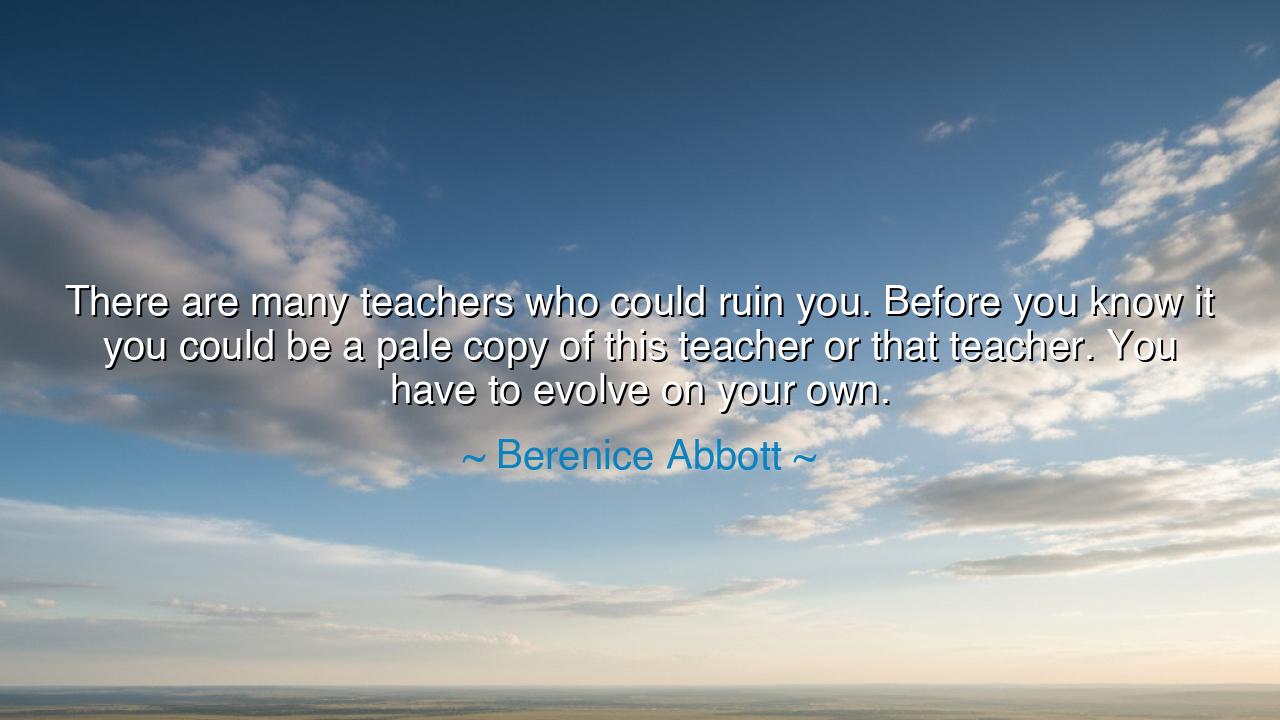
There are many teachers who could ruin you. Before you know it
There are many teachers who could ruin you. Before you know it you could be a pale copy of this teacher or that teacher. You have to evolve on your own.






The words of Berenice Abbott—“There are many teachers who could ruin you. Before you know it you could be a pale copy of this teacher or that teacher. You have to evolve on your own”—resound like a warning bell to every seeker of wisdom. She speaks of a danger subtle but deadly: the loss of the self. For while teachers are guides, and while instruction is a lamp in the darkness, there is a peril in surrendering too much. To imitate without discernment, to absorb without transformation, is to abandon the unique spark that makes each soul irreplaceable.
The origin of such wisdom lies in the eternal struggle between imitation and originality. From the dawn of civilization, students have gathered around masters: disciples listening to prophets, apprentices learning from craftsmen, artists studying under mentors. Yet even in the ancient world, the wisest voices cautioned against blind imitation. Plato himself warned of shadows on the wall, urging men to seek truth, not mere reflection. In the East, the Zen masters rebuked students who clung to their teachers’ words, saying, “If you meet the Buddha on the road, kill him.” Abbott’s words echo this timeless teaching: respect the guide, but walk your own path.
Consider the story of Vincent van Gogh. He studied the works of the Impressionists, absorbing their colors, their brushstrokes, their light. Yet had he remained a mere imitator, history would not know his name. Instead, he took what he learned and allowed it to evolve into his own fiery vision—turbulent skies, blazing fields, portraits that throb with life. He refused to be a pale copy of others; he chose instead to be the bold original that shook the world of art. In him, we see Abbott’s truth: one must evolve on their own, or else vanish as a shadow of another’s light.
The emotional force of Abbott’s words lies in their recognition of vulnerability. Young learners, eager to grow, often revere their teachers to the point of surrendering their individuality. They think themselves faithful when in fact they are becoming copies. But faithfulness is not mimicry—it is courage. It is taking the essence of what is taught and transforming it through the fire of one’s own soul. True honor to the teacher lies not in becoming them, but in becoming fully oneself.
There is also something heroic in Abbott’s declaration, for to evolve on one’s own is not the easy path. It is the path of loneliness, struggle, and doubt. The world praises conformity and rewards resemblance; originality often invites mockery or resistance. Yet history shows that it is always the unrepeatable individuals who shape the future: Socrates, Galileo, Emily Dickinson, James Baldwin. Each studied deeply, yet each refused to remain bound by imitation. Each heard the voices of teachers, but listened most intently to the voice within.
The lesson for us is clear: honor your teachers, but guard your soul. Take what is useful from their guidance, but never forget that their road is not your road. You must walk your own journey, shaped by your own struggles, guided by your own vision. For if you lose yourself in imitation, you betray not only your own gift but also the purpose of your teacher, who sought to awaken, not to replace, you.
What, then, shall we do? Let us approach learning with humility, yet also with discernment. Let us absorb wisdom, but filter it through the uniqueness of our own minds. Let us resist the temptation to compare ourselves endlessly to others, and instead ask: what truth is mine to speak, what creation is mine to bring forth, what life is mine to live? In doing so, we honor both our teachers and ourselves.
Thus, Abbott’s words endure as a beacon: beware of becoming a pale copy, for the world already has enough shadows. It longs instead for your light, your originality, your truth. To evolve on your own is not arrogance—it is obedience to the sacred duty of being who you were meant to be. And that is the highest form of learning: to take all that was given and then to stand, not as another’s echo, but as your own clear voice in the chorus of humanity.






AAdministratorAdministrator
Welcome, honored guests. Please leave a comment, we will respond soon